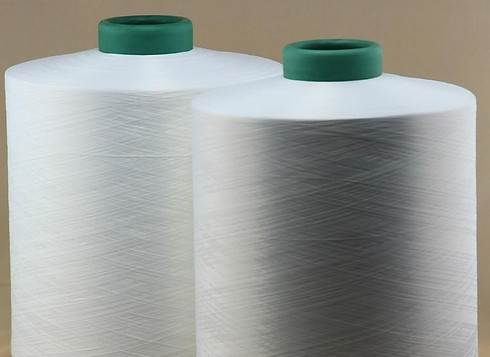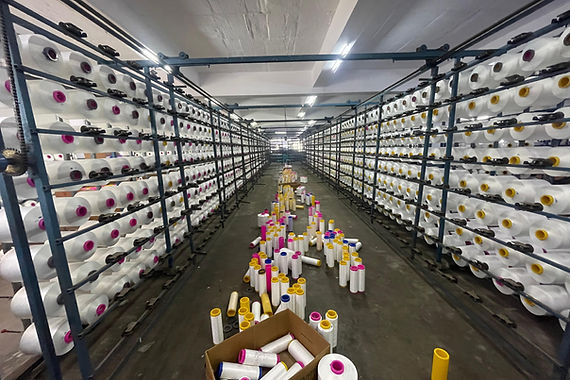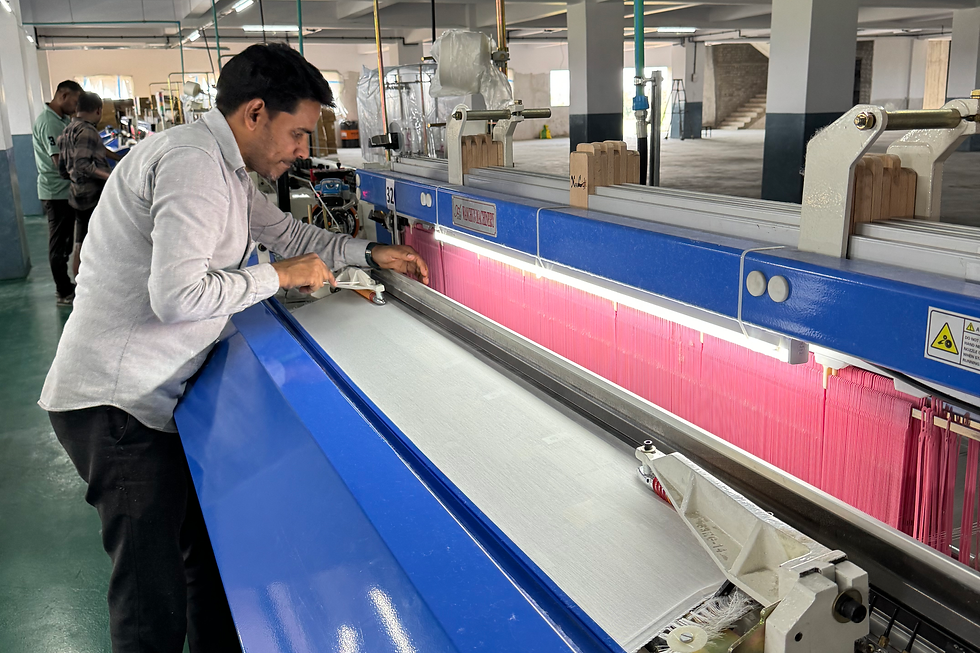Lakhani Silk Mills Private Limited


DTY PLANT
Texturizing
In a Draw Textured Yarn (DTY) plant, the focus is on producing synthetic yarns with specific properties. DTY yarns are typically made from polyester or nylon and undergo a texturizing process to enhance their elasticity, softness, and bulkiness.
The DTY plant's production process requires precision control to ensure consistent quality and performance of the yarn. Additionally, sustainability practices, including the efficient use of resources and minimizing environmental impact, are increasingly important considerations in modern DTY manufacturing.
DTY Yarn
The term "DTY" stands for Draw Texturized Yarn. DTY, also known as crimped yarn, is a texturized yarn that has elasticity and resilience. There is a technique called texturing that is used to make the yarn thick, elongated, and have a plush texture. Stretch fabric is often produced with the DTY, trying to make the feel of natural cotton with a man-made material.
WEAVING PLANT
At lakhani Silk Mills, We use both Water-jet and Air-jet Weaving Technology to produce Fabric.
WEAVING
WARPING
This is the work of warp preparation. Each vertical thread (called a warp), which will contribute to the composition of the fabric, is lined beside the other to reach the effect on the design of the end fabric (which could sometimes reach up to 16, 000). Warp cones should be attached to jargon named Creel. The threads are then wound onto the reel, a large steel cylinder, to be loaded onto the warp beam, a smaller cylinder that will be loaded onto the loom.


DRAWING IN
To create fabrics with different structures (e.g., Oxford, poplin), each thread has to move in a precise order; for this reason, it is placed in the slats of the warp stop and drawn thread by thread through the eyes of the heddle and the teeth of the reed. If a loom weaves successive fabrics with the same structure, the drawing in the stage can be skipped, and each thread is tied to the corresponding warp thread that ends directly in the loom. Thanks to modern technology, it is possible to draw in up to 200 threads per minute through the heddles, reed, and comb in one pass. Despite the highly automated process, it still requires 2.5 hours of work to draw in an entire beam.
At Lakhani Silk Mills Private Limited, our manufacturing process blends traditional craftsmanship with modern technology to produce premium textile products. Our facilities are equipped with state-of-the-art machinery for spinning, weaving, finishing, and packaging, ensuring efficiency and quality at every stage.
DTY Yarn Production
We start with the finest raw materials to create DTY yarns through texturizing and twisting processes. With a production capacity of 11,000 metric tons per annum, we maintain consistent quality to meet the diverse needs of our customers.
Waterjet Fabric Manufacturing
Using advanced waterjet looms, we produce high-quality grey fabric known for its durability and versatility. With a capacity of 5,47,50,000 meters per annum, we fulfill large orders efficiently while maintaining superior quality.
Quality Control
Our experienced team conducts rigorous inspections at every step to ensure adherence to industry standards. From yarn strength to fabric texture, we prioritize quality to deliver products that meet customer specifications.
Manufacturing




.png)
.png)
Lakhani Silk Mills Private Limited specializes in high-quality textile products designed to meet the diverse needs of our customers:
1. DTY Yarn:
Our Draw Texturised Yarn (DTY) is renowned for its exceptional texture, strength, and elasticity. With a production capacity of 11,000 metric tons per annum, our DTY yarn is suitable for various applications.
2. Waterjet Grey Fabric:
Crafted using advanced technology, our waterjet grey fabric boasts a capacity of 5,47,50,000 meters per annum. Known for its durability and versatility, it is ideal for a wide range of uses, from apparel to home furnishings.
3. Airjet Fabric:
Our airjet fabric, with a capacity of 2,55,25,000 meters per annum, is renowned for its softness and smoothness. It offers superior comfort and quality, making it a popular choice for apparel and upholstery.Each of our products undergoes rigorous quality control measures to ensure consistency and reliability. Contact us to explore our range and discover how our products can enhance your textile projects.
Products



Lakhani Silk Mills Private Limited ensures the safe storage and preservation of our textile products through:
-
Advanced Facilities: Equipped with cutting-edge technology for inventory management, temperature control, and security.
-
Inventory Management: Utilizing advanced systems to track product movement and maintain optimal stock levels.
-
Temperature Control: Climate-controlled facilities to preserve the quality of our products, particularly sensitive items like DTY yarn and fabrics.
-
Security Measures: Robust surveillance, access control, and on-site security to protect our inventory.
-
Quality Assurance: Regular inspections and maintenance to uphold cleanliness and product integrity.
-
Customer Accessibility: Providing easy access for customer inspections and pickups while maintaining security and quality control.
Partner with us for secure and reliable storage solutions. Contact us to learn more
Storage
-
MACHINERY WEAVING
Once the weft and the warp interlace, fabrics are made, which is the result of the fusion of the raw material with the uniqueness of the pattern and design. The weaving is made on highly advanced weaving looms using a complex process carried out with the greatest care in a controlled environment, with great experience from the weaving staff. Amazingly, a loom can manufacture the finest and most delicate fabrics even if it manipulates only once per hour, but on the other hand, it can produce as many as 640 passes per minute when weaving the simplest varieties. The fabric left with a gray, unfinished color at this point is called the grey fabric.


MENDING
An intersection of the warp yarn and the weft results in what is fashioned as the fabric, which corroborates the interplay between materials and the imagination of the designer and their structures and patterns at play. The weaving is done on highly sophisticated weaving looms through a very complex process that is carried out with the utmost care in a controlled environment and with the great experience of the weaving staff. The looms are capable of weaving the simplest fabric with 640 passes per minute, and, on the other hand, they can complete the most intricate and delicate one, but much slower than the main fabric. At this point in the process, this unfinished fabric is what is called greige.
FOLDING
Then, after it goes through the weaving and inspection, it gets to the folding process. This procedure is realized by the production of manageable foldable pieces of fabric in length or width, depending on the customer’s requirements or the next operation.
The folded fabric may be wound on tubes or folded on boards to make it easy to handle and transport. Computer-controlled folding machines will guarantee uniformity while taking care of the efficient folding process. When folded, the fabric is ready for packing and dispatching to customers or to other stages of finishing that require further dying or printing processes.
Ready To Dispatch...!

